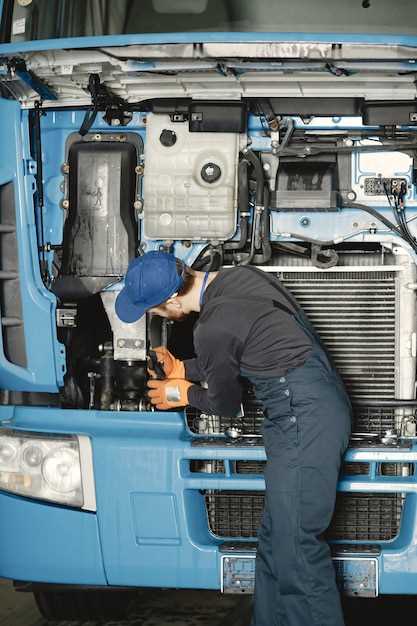

Maintaining a truck is essential for ensuring its longevity and optimal performance. Regular care and proper maintenance can prevent costly repairs and downtime, allowing truck owners to maximize the value of their investment. Understanding the key aspects involved in truck maintenance is crucial for both novice and experienced drivers.
From routine inspections to addressing minor issues before they escalate, effective truck maintenance requires a systematic approach. By prioritizing specific areas, such as the engine, brakes, and tires, owners can keep their vehicles in peak condition. In this article, we will explore practical tips that will help you maintain your truck over the long term, ensuring it runs smoothly and efficiently.
Ultimately, a well-maintained truck not only enhances safety on the road but also contributes to better fuel efficiency and lower emissions. Investing time and resources into regular maintenance activities will pay off in the long run. Let’s delve into the essential practices that every truck owner should adopt for effective care and long-lasting maintenance.
Regular Inspection of Engine and Transmission Components

Regular inspection of your truck’s engine and transmission components is essential for maintaining optimal performance and ensuring longevity. This aspect of truck care cannot be overlooked, as it plays a critical role in preventing costly repairs and downtime.
Engine inspection should include checking for fluid leaks, inspecting belts and hoses for wear and tear, and ensuring that the air and fuel filters are clean. Regularly checking oil levels and replacing the engine oil according to the manufacturer’s recommendations are crucial for optimal engine performance. An engine that is well-maintained can enhance fuel efficiency and reduce emissions.
In addition to the engine, the transmission system requires careful attention. Inspecting the transmission fluid for discoloration or contamination is necessary, as this can indicate underlying issues that need immediate care. Regular fluid changes, along with checking for leaks and ensuring that all components are functioning correctly, are vital for a smooth driving experience.
Timely inspections and proper maintenance of both the engine and transmission components not only enhance the reliability of your truck but also contribute to safety on the road. Keeping a detailed log of inspections and maintenance activities can help track performance trends and detect potential problems early, thus avoiding more significant issues down the line.
Optimal Tire Care for Longevity and Safety

Effective maintenance of your truck’s tires is crucial for ensuring their longevity and enhancing safety on the road. Tires are the only contact point between your vehicle and the road surface, making their care paramount for both performance and safety.
Regular long-term inspections should be a priority. Check tire pressure at least once a month, as improper inflation can lead to premature wear and reduce fuel efficiency. Ideally, maintain the pressure levels recommended by the manufacturer, typically found on the driver’s side door or in the owner’s manual.
Tread depth is another critical aspect of tire maintenance. Use the penny test to check tread wear: insert a penny into the tread with Lincoln’s head facing down. If you can see all of Lincoln’s head, it’s time to replace the tires. Adequate tread depth ensures proper grip and prevents hydroplaning during wet conditions.
Rotation is essential to promote even wear across all tires. Regularly rotating your tires every 5,000 to 7,500 miles can help extend their lifespan. This process involves moving the front tires to the back and vice versa, which can help balance out the wear incurred from different driving conditions.
Another vital practice is alignment and balancing. Misalignment can cause uneven wear and compromise safety. Have your truck’s alignment checked periodically, especially after hitting a pothole or curb. This not only enhances the lifespan of your tires but also ensures a smoother driving experience.
Moreover, avoid overloading your truck. Adhering to the specified load limit is fundamental to tire health. Exceeding this limit can increase wear and tear and lead to blowouts.
Lastly, frequent visual inspections for signs of damage such as cracks, cuts, or bulges are critical. If any abnormalities are noticed, consult a professional immediately to prevent potential accidents.
By implementing these optimal tire care practices, truck owners can significantly enhance tire longevity, safety, and overall operating efficiency.
Scheduled Fluid Changes and Filter Replacements
Regular care for your truck involves meticulous attention to scheduled fluid changes and filter replacements. These practices are vital in maintaining optimal performance and extending the life of your vehicle. Ignoring these essential maintenance tasks can lead to severe consequences, including engine damage and decreased fuel efficiency.
Engine Oil: Engine oil lubricates moving parts, reduces friction, and prevents overheating. It is advisable to change the engine oil every 5,000 to 7,500 miles or as recommended in your truck’s owner’s manual. Frequent checks of oil levels and quality can help you avoid costly repairs.
Transmission Fluid: The transmission fluid keeps your truck’s transmission cool and clean. It is vital to replace this fluid as per the manufacturer’s specifications, typically every 30,000 to 60,000 miles. Ensuring the transmission fluid is in good condition aids in smoother gear shifts and prolongs transmission life.
Brake Fluid: Brake fluid is crucial for the safe operation of your vehicle. It absorbs moisture over time, which can lead to brake failure. Regularly checking and replacing brake fluid every two years helps maintain braking efficiency and safety.
Coolant: The coolant keeps the engine within an optimal temperature range. It should be replaced approximately every 50,000 miles or according to your truck’s maintenance schedule. Neglecting coolant changes can result in engine overheating and potential damage.
Power Steering Fluid: This fluid enables smooth steering. Regular checks and changes are necessary to avoid steering complications. Typically, it should be replaced every 50,000 miles or as needed based on visual inspections.
Filters: Replacing filters regularly is an integral part of truck maintenance. Air filters ensure clean air intake, while fuel filters prevent contaminants from entering the fuel system. Change both types of filters according to the maintenance schedule to ensure optimal engine performance and longevity.
By adhering to a strict schedule for fluid changes and filter replacements, you not only show care for your truck but also safeguard its performance and reliability over the long term. Utilizing checklists and reminders can aid in keeping these maintenance tasks on track.